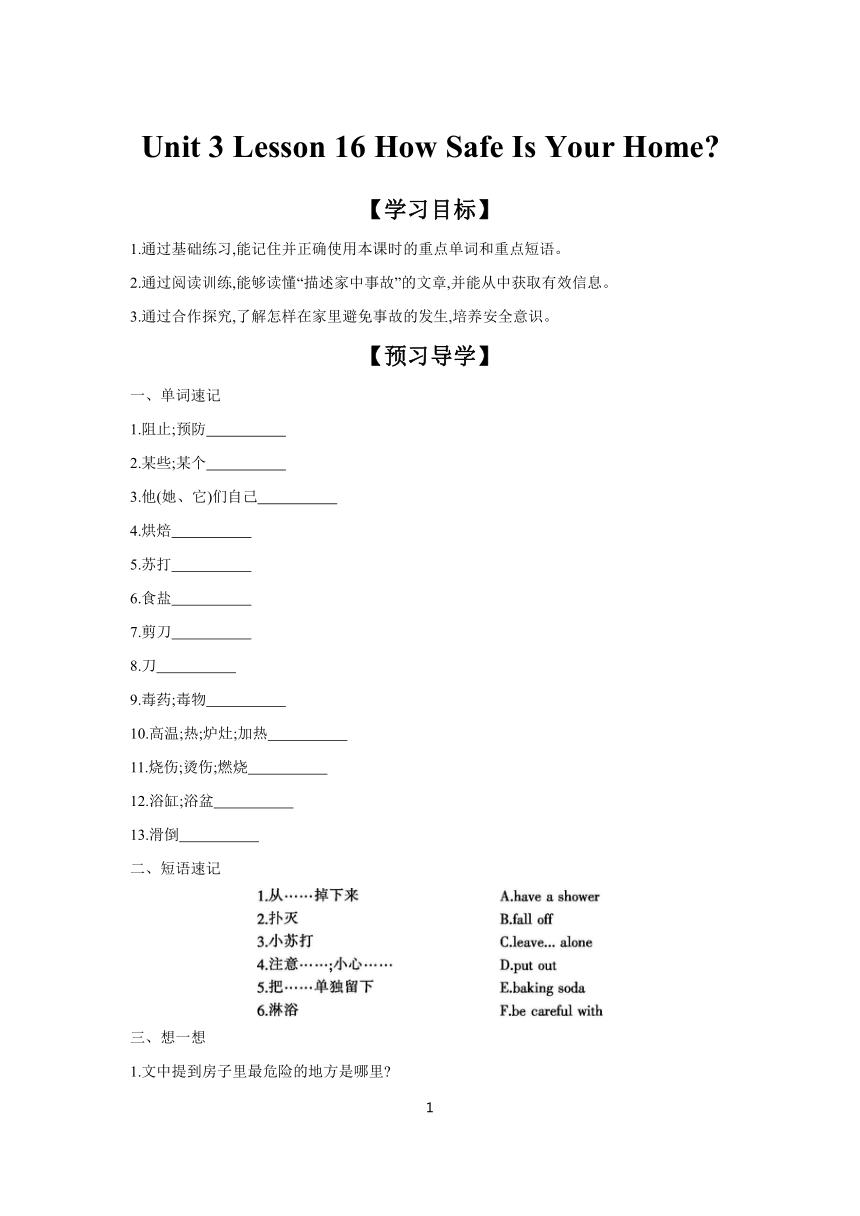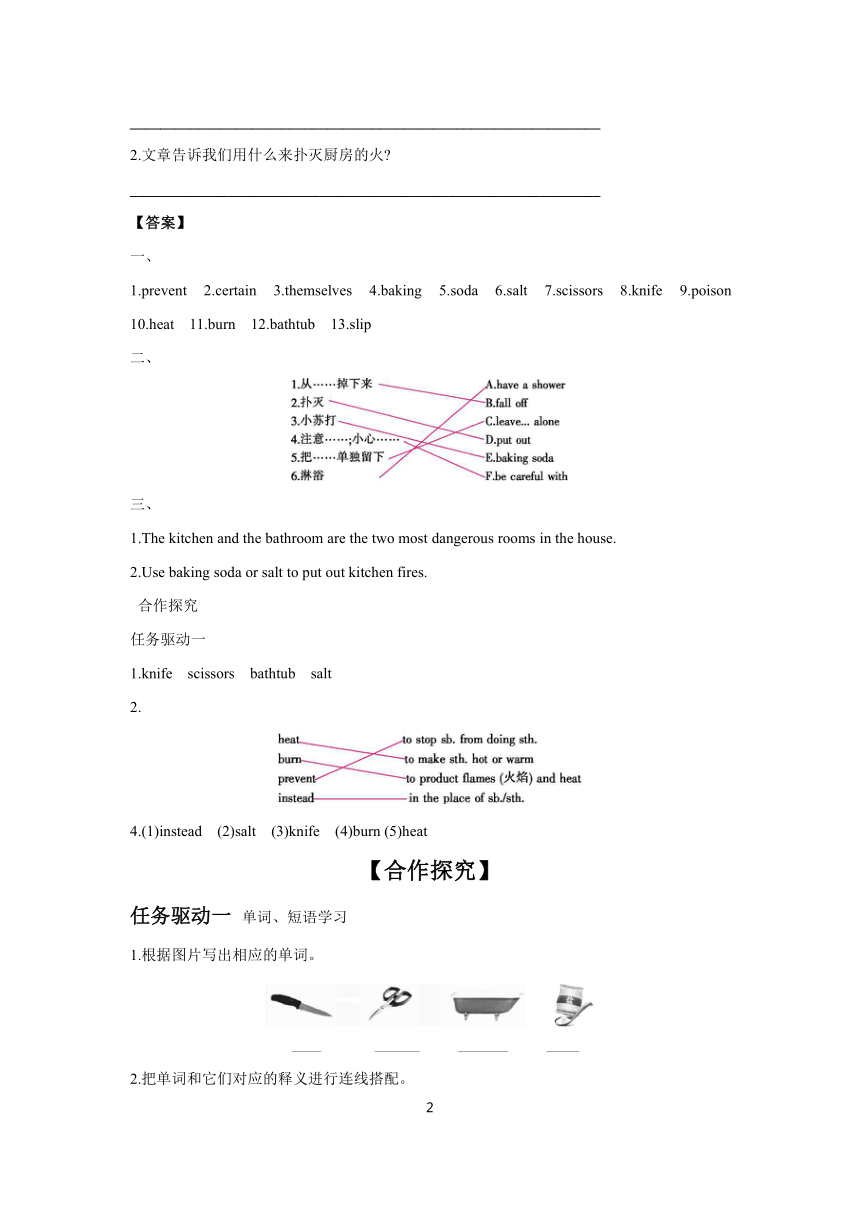Unit 3 Lesson 16 How Safe Is Your Home? 学案 (含答案)
文档属性
| 名称 | Unit 3 Lesson 16 How Safe Is Your Home? 学案 (含答案) |

|
|
| 格式 | docx | ||
| 文件大小 | 153.9KB | ||
| 资源类型 | 教案 | ||
| 版本资源 | 冀教版 | ||
| 科目 | 英语 | ||
| 更新时间 | 2024-02-28 00:00:00 | ||
图片预览


文档简介
Unit 3 Lesson 16 How Safe Is Your Home
【学习目标】
1.通过基础练习,能记住并正确使用本课时的重点单词和重点短语。
2.通过阅读训练,能够读懂“描述家中事故”的文章,并能从中获取有效信息。
3.通过合作探究,了解怎样在家里避免事故的发生,培养安全意识。
【预习导学】
一、单词速记
1.阻止;预防
2.某些;某个
3.他(她、它)们自己
4.烘焙
5.苏打
6.食盐
7.剪刀
8.刀
9.毒药;毒物
10.高温;热;炉灶;加热
11.烧伤;烫伤;燃烧
12.浴缸;浴盆
13.滑倒
二、短语速记
三、想一想
1.文中提到房子里最危险的地方是哪里
______________________________________________________________
2.文章告诉我们用什么来扑灭厨房的火
______________________________________________________________
【答案】
一、
1.prevent 2.certain 3.themselves 4.baking 5.soda 6.salt 7.scissors 8.knife 9.poison 10.heat 11.burn 12.bathtub 13.slip
二、
三、
1.The kitchen and the bathroom are the two most dangerous rooms in the house.
2.Use baking soda or salt to put out kitchen fires.
合作探究
任务驱动一
1.knife scissors bathtub salt
2.
4.(1)instead (2)salt (3)knife (4)burn (5)heat
【合作探究】
任务驱动一 单词、短语学习
1.根据图片写出相应的单词。
2.把单词和它们对应的释义进行连线搭配。
3.齐读短语: baking soda, stay calm, have a shower, fall off ,put out, be careful with。
4.完成Let's Do It! 2,并核对答案。
(1)Tom won't drive to Beijing.He'll take a bus i .
(2)We should eat less s to prevent heart disease.
(3)Take the k away.The little boy may cut himself.
(4)A hot coal fell out the fire and b the shoes.
(5)Grandma likes to sit in the sun.She enjoys the h of the sun.
任务驱动二 阅读训练
1.Read the passage.Monitor the students' pronunciation and comprehension.
2.Show Let's Do It! 1.Read the lesson and complete the table.
3.Read the text and answer the following questions.
(1)Why are the kitchen and the bathroom the two most dangerous rooms in the house
______________________________________________________________
(2)What are the safety tips to prevent accidents in the kitchen
______________________________________________________________
(3)What are the safety tips to prevent accidents in the bathroom
______________________________________________________________
(4)Why shouldn’t parents leave young children alone in the bathtub
______________________________________________________________
任务驱动三 小组活动(家庭安全)
以小组为单位,用祈使句列举家庭安全的建议。
需要用到的语言结构:Be/Do... 、Don't be/do...
如:Many serious accidents happen in our homes.So we should be careful.Be careful with hot water.It can scald (烫伤) you badly.Don't climb trees or high walls...
【答案】
任务驱动二
3.(1)Because most accidents happen in the kitchen and the bathroom.
(2)Don't stand on chairs. Don't use water to put out kitchen fires. Be careful with scissors and knives. Don't keep poisons in the kitchen.
(3)Never use electricity in the shower or bathtub. Be sure to keep the bathroom floor dry after you have a shower or bath.
(4)Because children may slip and fall on the wet floors.
【知识超市】
[命题点一]Don't use water to put out kitchen fires.不要用水扑灭厨房里的火。
put out意为“扑灭”,是动副短语,若宾语为代词,只能放在put和out之间。如:
Far water does not put out near fire.[谚]远水救不了近火。
The forest was on the fire but the firemen put it out quickly.森林着火了,但消防员迅速扑灭了。
拓展:
put的其他短语
对点自测
根据汉语意思完成句子。
1.这些年轻的消防员勇敢地扑灭了森林大火。
The young firemen were to put out the fire in the forest.
2.把火扑灭花费了人们几个小时。
It took people several hours to the fire.
3.现在你把手伸出去是危险的。
It's dangerous to your hand now.
【答案】
1.brave enough
2.put out
3.put out
[命题点二]You don't want to burn yourself.你不会想烧伤你自己。
burn是及物动词,意为“烧伤,烫伤”,其过去式是burned/burnt,过去分词burned/burnt。如:
The child burnt his fingers while playing with fire.那孩子玩火时烧伤了自己的手指。
拓展:
(1)burn还可作不及物动词,意为“燃烧”。 如:
You'd better keep the fire burning in the evening.你最好晚上让炉火继续燃烧。
(2)burn还可作名词,意为“烧伤,烫伤”。如:
The serious burn on her hand was caused by a hot iron.她手上那块严重的烧伤是被熨斗烫伤的。
对点自测
用所给单词的适当形式填空。
1.The stove is (burn).
2.The careless boy (burn) his mouth when he drank hot soup.
3.I put a lighted match to the letter and watched it (burn) on the ground.
【答案】
1.burning 2.burnt 3.burning
2
【学习目标】
1.通过基础练习,能记住并正确使用本课时的重点单词和重点短语。
2.通过阅读训练,能够读懂“描述家中事故”的文章,并能从中获取有效信息。
3.通过合作探究,了解怎样在家里避免事故的发生,培养安全意识。
【预习导学】
一、单词速记
1.阻止;预防
2.某些;某个
3.他(她、它)们自己
4.烘焙
5.苏打
6.食盐
7.剪刀
8.刀
9.毒药;毒物
10.高温;热;炉灶;加热
11.烧伤;烫伤;燃烧
12.浴缸;浴盆
13.滑倒
二、短语速记
三、想一想
1.文中提到房子里最危险的地方是哪里
______________________________________________________________
2.文章告诉我们用什么来扑灭厨房的火
______________________________________________________________
【答案】
一、
1.prevent 2.certain 3.themselves 4.baking 5.soda 6.salt 7.scissors 8.knife 9.poison 10.heat 11.burn 12.bathtub 13.slip
二、
三、
1.The kitchen and the bathroom are the two most dangerous rooms in the house.
2.Use baking soda or salt to put out kitchen fires.
合作探究
任务驱动一
1.knife scissors bathtub salt
2.
4.(1)instead (2)salt (3)knife (4)burn (5)heat
【合作探究】
任务驱动一 单词、短语学习
1.根据图片写出相应的单词。
2.把单词和它们对应的释义进行连线搭配。
3.齐读短语: baking soda, stay calm, have a shower, fall off ,put out, be careful with。
4.完成Let's Do It! 2,并核对答案。
(1)Tom won't drive to Beijing.He'll take a bus i .
(2)We should eat less s to prevent heart disease.
(3)Take the k away.The little boy may cut himself.
(4)A hot coal fell out the fire and b the shoes.
(5)Grandma likes to sit in the sun.She enjoys the h of the sun.
任务驱动二 阅读训练
1.Read the passage.Monitor the students' pronunciation and comprehension.
2.Show Let's Do It! 1.Read the lesson and complete the table.
3.Read the text and answer the following questions.
(1)Why are the kitchen and the bathroom the two most dangerous rooms in the house
______________________________________________________________
(2)What are the safety tips to prevent accidents in the kitchen
______________________________________________________________
(3)What are the safety tips to prevent accidents in the bathroom
______________________________________________________________
(4)Why shouldn’t parents leave young children alone in the bathtub
______________________________________________________________
任务驱动三 小组活动(家庭安全)
以小组为单位,用祈使句列举家庭安全的建议。
需要用到的语言结构:Be/Do... 、Don't be/do...
如:Many serious accidents happen in our homes.So we should be careful.Be careful with hot water.It can scald (烫伤) you badly.Don't climb trees or high walls...
【答案】
任务驱动二
3.(1)Because most accidents happen in the kitchen and the bathroom.
(2)Don't stand on chairs. Don't use water to put out kitchen fires. Be careful with scissors and knives. Don't keep poisons in the kitchen.
(3)Never use electricity in the shower or bathtub. Be sure to keep the bathroom floor dry after you have a shower or bath.
(4)Because children may slip and fall on the wet floors.
【知识超市】
[命题点一]Don't use water to put out kitchen fires.不要用水扑灭厨房里的火。
put out意为“扑灭”,是动副短语,若宾语为代词,只能放在put和out之间。如:
Far water does not put out near fire.[谚]远水救不了近火。
The forest was on the fire but the firemen put it out quickly.森林着火了,但消防员迅速扑灭了。
拓展:
put的其他短语
对点自测
根据汉语意思完成句子。
1.这些年轻的消防员勇敢地扑灭了森林大火。
The young firemen were to put out the fire in the forest.
2.把火扑灭花费了人们几个小时。
It took people several hours to the fire.
3.现在你把手伸出去是危险的。
It's dangerous to your hand now.
【答案】
1.brave enough
2.put out
3.put out
[命题点二]You don't want to burn yourself.你不会想烧伤你自己。
burn是及物动词,意为“烧伤,烫伤”,其过去式是burned/burnt,过去分词burned/burnt。如:
The child burnt his fingers while playing with fire.那孩子玩火时烧伤了自己的手指。
拓展:
(1)burn还可作不及物动词,意为“燃烧”。 如:
You'd better keep the fire burning in the evening.你最好晚上让炉火继续燃烧。
(2)burn还可作名词,意为“烧伤,烫伤”。如:
The serious burn on her hand was caused by a hot iron.她手上那块严重的烧伤是被熨斗烫伤的。
对点自测
用所给单词的适当形式填空。
1.The stove is (burn).
2.The careless boy (burn) his mouth when he drank hot soup.
3.I put a lighted match to the letter and watched it (burn) on the ground.
【答案】
1.burning 2.burnt 3.burning
2
同课章节目录
- Unit 1 Stay Healthy
- Lesson 1 What's Wrong,Danny?
- Lesson 2 A Visit to the Dentist
- Lesson 3 Good Food, Good Health
- Lesson 4 Don't Smoke, Please!
- Lesson 5 Jane's Lucky Life
- Lesson 6 Stay Away from the Hospital
- Unit Review
- Unit 2 Great People
- Lesson 7 What Is the Meaning of Lift?
- Lesson 8 A Universe of Thought
- Lesson 9 China's Most Famous "Farmer"
- Lesson 10 Touch the World
- Lesson 11 To China, with Love
- Lesson 12 Guess My Hero!
- Unit Review
- Unit 3 Safety
- Lesson 13 Be Careful,Danny!
- Lesson 14 Accidents Happen
- Lesson 15 My Helmet Saved My Life!
- Lesson 16 How Safe Is Your Home?
- Lesson 17 Staying Safe in an Earthquake
- Lesson 18 Never Catch a Dinosaur
- Unit Review
- Unit 4 Stories and poems
- Lesson 19 A Story or a Poem?
- Lesson 20 Say It in Five
- Lesson 21 The Fable of the Woodcutte
- Lesson 22 The Giant(Ⅰ)
- Lesson 23 The Giant(Ⅱ)
- Lesson 24 Writing a Poem
- Unit Review
- Unit 5 Look into Science
- Lesson 25 Let's Do an Experiment!
- Lesson 26 Keep the Candle Burning
- Lesson 27 Planet Danny
- Lesson 28 The Study of Living Things
- Lesson 29 DNA—The Story of You
- Lesson 30 Science Affects Us
- Unit Review
- Unit 6 Movies and Theate
- Lesson 31 A movie or a Play
- Lesson 32 Moving Pictures
- Lesson 33 The Fisherman and the Goldfish(Ⅰ)
- Lesson 34 The Fisherman and the Goldfish(Ⅱ)
- Lesson 35 Theatres Are Fun!
- Lesson 36 Making Plays Is Fun
- Unit Review
